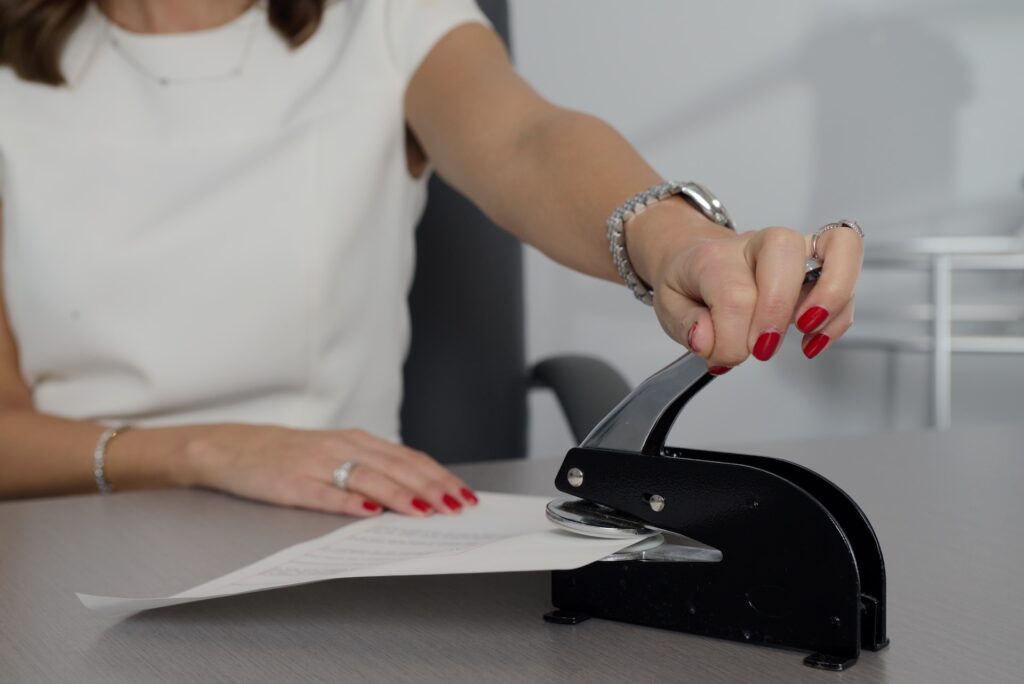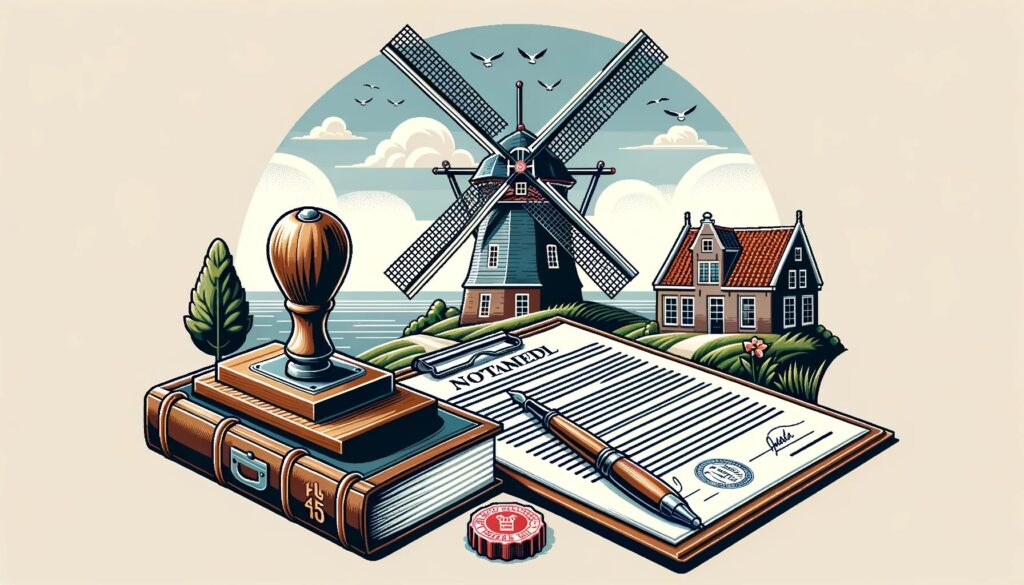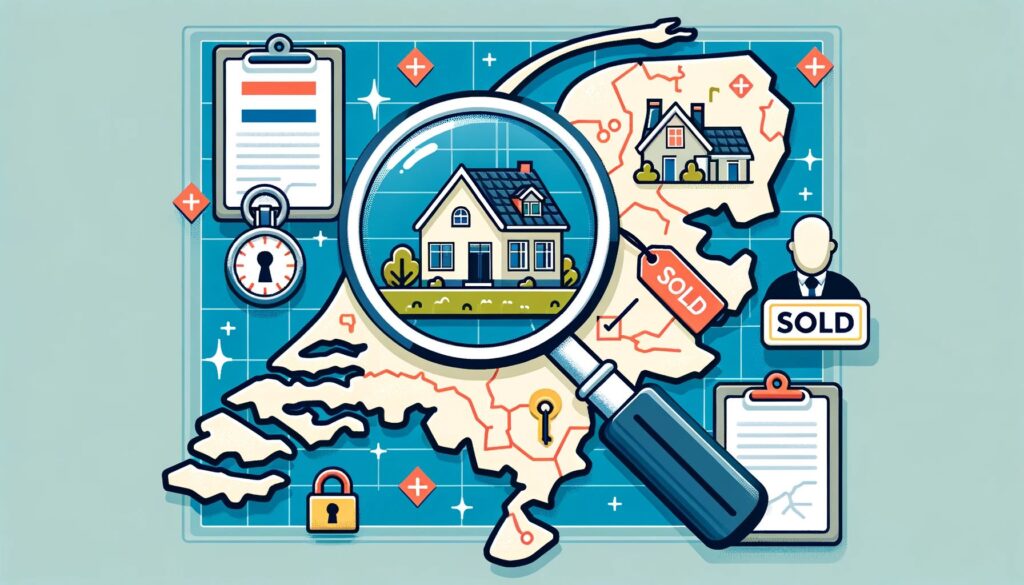Introduction
Navigating the complexities of buying a house in the Netherlands can be a daunting experience, especially for expatriates unfamiliar with the Dutch legal system. Besides the real estate agent (makelaar) and mortgage advisor you might encounter, the notary plays an indispensable role, particularly during the house closing phase. If you find yourself wondering, “What exactly does a notary do, and why do I need one?”, you’ve come to the right place. This comprehensive guide aims to shed light on the specific duties of a notary during house closing, from finalizing legal documents to conducting background checks. We also delve into choosing the right notary, what fees to expect, and the optimal timing for involving a notary in your property purchase. So, whether you’re a first-time buyer or a seasoned investor, this post is designed to arm you with the knowledge you need for a smooth, successful transaction.

What is a Notary?
A notary in the Netherlands is a legal professional authorized to execute and certify various types of documents, ensuring their authenticity and binding nature. Contrary to popular belief, a notary is more than just a human stamp; they offer valuable legal advice and play a pivotal role in safeguarding the interests of all parties involved in an agreement.
Notaries specialize in a wide array of fields, such as:
- Estate Planning: Including wills, testaments, and inheritance matters. Their involvement ensures a clear, enforceable division of assets.
- Marriage and Partnership Contracts: Advising on property division and financial agreements in case of separation or divorce.
- Real Estate Transactions: From house purchases to property investments, they cover everything, including mortgage handling.
- Business Contracts: Helping businesses draft and finalize contracts, ensuring they align with the law.
Notaries are impartial, meaning they don’t represent any party. Instead, they focus on fair play and transparent transactions. This ensures that everyone’s interests are protected, and disputes are minimized. For example, if siblings are dividing an inheritance, a notary helps in documenting the division so that there are no legal issues later on.
It’s also crucial to understand that the role of a notary in the Netherlands is bound by legal obligations. They are required to check the identity of all parties, provide full disclosure, and store documents safely for future reference.
In essence, the notary is a linchpin in multiple areas of law and everyday life, acting as a shield against legal pitfalls. Whether you’re signing a marriage contract, setting up a business, or buying a home, a notary is there to guide you, ensuring that you make decisions with full knowledge and security.

Why You Need a Notary for House Closing?
While you may be eager to get the keys to your new home, there are a series of legal steps to complete first. Among these, the notary plays an indispensable role, ensuring a smooth and secure transition of property ownership. But why exactly do you need a notary when closing on a house in the Netherlands?
Legal Requirement
First and foremost, the law mandates it. The involvement of a notary in real estate transactions isn’t just good practice; it’s a legal necessity. Failure to engage a notary can render your property deal invalid, so you don’t have much choice in the matter.
Document Preparation and Validation
Navigating through a forest of documents can be confusing and stressful. A notary handles the heavy lifting for you, preparing, validating, and signing off on key documents such as the deed of transfer and mortgage deeds. This expertise ensures you’re not signing something now that could haunt you later.
Background Checks by Notary
It’s crucial to ensure that both the buyer and the seller are who they say they are and that they have the legal rights and financial standing to partake in the transaction. A notary carries out the essential background checks to verify the identity of the parties involved and clarify any legal requisites.
Notary as Neutral Third Party
Imagine a scenario where the buyer wants a quick close, but the seller wants to ensure all pending legal formalities are met. The notary acts as a neutral mediator who ensures fairness and impartiality, balancing the interests of both parties. This neutrality is especially important in situations where conflicts of interest could arise.
Financial Security
Lastly, when dealing with a transaction as significant as a home purchase, financial security is paramount. The notary oversees the financial aspects, handling the receipt and disbursement of funds. They will only release the funds to the seller after ensuring all contractual obligations are fulfilled, giving both parties peace of mind.
In summary, a notary serves as your legal safeguard during the home buying process. Their involvement ensures that all paperwork is in order, all parties are legitimate, and all financial transactions occur securely and fairly. Engaging a notary is not just a legal formality but a crucial step in protecting your investment.

Specific Duties of the Notary During House Closing
Understanding the exact duties of a notary during house closing can remove much of the uncertainty around this vital step in your property buying journey. Let’s dive into the specifics.
Akte van Levering (Deed of Transfer)
After you sign the initial purchase agreement, the notary crafts the “Akte van Levering” or the deed of transfer. This essential document confirms that the property’s ownership will move from the seller to you, the buyer. The notary will ensure that the deed aligns with the terms outlined in the purchase agreement. In the event of any discrepancies, the notary will rectify these before the document is finalized.
Importance: A faulty or unclear deed of transfer could lead to legal complications down the road. The notary prevents this by carefully cross-referencing all information and ensuring every detail is accurate.
Opstellen van de Hypotheekakte (Mortgage Deed)
If you’re taking out a mortgage, the notary is responsible for drafting another critical document, the “Opstellen van de Hypotheekakte” or mortgage deed. They take the information provided by your lender and incorporate it into a legally binding document. This deed will outline the terms of your mortgage and the rights of the lender should you fail to meet your obligations.
Example: Suppose you’re considering renovations after purchasing your home. You might want to opt for a higher mortgage inscription in the mortgage deed. This is something your notary can advise you on, offering you more financial flexibility down the line.
Due Diligence and Background Checks
Beyond document preparation, a notary performs detailed background checks on both the buyer and the seller. They confirm that the seller is the true owner of the property and has the legal right to sell it. On the other side, they verify the buyer’s identity and financial capability to fulfill the terms of the purchase agreement.
Importance: These checks serve as a safeguard against fraudulent activities and legal complications. They ensure that the transaction is above board, legally and financially.
Financial Handling and Escrow Services from Notary
Handling finances in a property transaction is a sensitive task. The notary plays a pivotal role here. They create an escrow account to hold the purchase money until all parties meet the conditions set in the agreement. Upon confirmation, the notary disburses the funds to the seller and notifies the Land Registry to update the ownership records.
Importance: By serving as an impartial third party, the notary ensures financial security and minimizes the risk of fraud or disputes.
Registration with the Kadaster (Land Registry)
The final task for the notary is to register the new ownership and any mortgage liens with the Kadaster, the Dutch Land Registry. This public recording solidifies your legal claim to the property and is a crucial part of establishing ownership.
Importance: This step is vital for legal recognition and serves as a public record that you are the new owner of the property.
To summarize, the notary’s role in house closing is multi-faceted and extends far beyond simple document preparation. They are instrumental in ensuring that the transaction is legally sound, financially secure, and fair to all parties involved. By understanding these specific duties, you are better equipped to navigate the complex process of buying a home in the Netherlands.

Choosing the Right Notary
Choosing the right notary is a crucial step that can significantly impact your home-buying experience. There are some key factors to consider:
Location
Proximity matters. A notary close to your current residence or the property you intend to purchase simplifies the logistics of handling paperwork and attending meetings. This convenience can be particularly useful for sorting out last-minute issues or urgent requirements.
Price
Notaries in the Netherlands have the flexibility to set their fees, leading to varying costs for the same set of services. For a house closing. It’s essential to request a detailed breakdown of costs upfront to eliminate any surprises later on. Always compare fees from different notaries to get the best deal. Some may offer bundled services at a discounted rate, which could save you money in the long run.
Communication Style
Clear and efficient communication with your notary is crucial. Assess their responsiveness to your inquiries via email, phone, or in-person consultations. A notary who can translate complex legal jargon into easily understandable language will ease the often stressful process of real estate transactions.
Expertise
Notaries specialize in different legal sectors, ranging from estate planning to business contracts. Ensure that the notary you choose has a strong background in real estate transactions. Don’t hesitate to ask for references or check online reviews to verify their qualifications and experience.
Working Hours
Flexible working hours can be a lifesaver, especially if you have a busy schedule. Some notaries offer appointments during weekends or evenings, ensuring you can attend important meetings without disrupting your daily routine.
Additional Considerations
Language Skills
If you’re an expat or not fluent in Dutch, it’s highly recommended to opt for a notary who is proficient in English. This ensures you can understand all the documents and proceedings, reducing the risk of misunderstandings.
Personal Recommendations
Don’t underestimate the value of personal referrals. If friends, family, or your real estate agent can recommend a notary they’ve had a good experience with, it’s often worth considering.
Technology Savvy
In today’s digital age, a notary who employs up-to-date technology for secure document exchange, electronic signatures, and online consultations can add an extra layer of convenience to your home-buying process.
By meticulously considering these factors, you can choose a notary who not only satisfies your individual needs but also facilitates a smoother, more efficient house closing. Investing time in this choice can save you money, minimize stress, and most importantly, offer the peace of mind that all the legal elements of your property purchase are being managed professionally.

Notary Fees and Costs
Discussing the cost of engaging a notary is important to prevent any surprise expenses down the line. Generally, you can expect to pay between €800 to €1900 for notary services during the house purchasing process in the Netherlands. This fee covers the creation and registration of essential documents such as the deed of transfer and mortgage deed.
Breakdown of Costs
While the overall fee may sound steep, it’s important to know what this cost entails. Here’s a breakdown:
- Deed of Transfer: This is the document that makes the property legally yours. It takes skill to draft this deed, ensuring that all the legal requirements are fulfilled.
- Mortgage Deed: If you are financing your property through a mortgage, the notary will also draft a mortgage deed based on the lender’s terms.
- Registration: The notary will register these deeds in the Kadaster (Land Registry), making the transaction public record.
Tax Deductions
Good news! Some of these costs are tax-deductible. This is especially true for the mortgage deed, which is usually a deductible expense when you file your taxes. Make sure you keep all the invoices and receipts for record-keeping.
Additional Costs
Be cautious of additional costs that might arise. For example, if you require translation services for the deed or dual-language ceremonies, this could incur an extra fee. Some notaries may also charge for disbursements such as postage or administrative costs.
Compare and Negotiate
Lastly, notary fees are not set in stone. It’s perfectly acceptable to shop around and compare prices. Don’t hesitate to ask for itemized quotes and negotiate the terms. Sometimes, bundled services can offer cost-saving advantages.

When to Involve a Notary in Your House Purchase
While it’s important to consult a notary early on, the formal involvement of the notary in the Netherlands specifically begins after you have signed the purchase agreement (“koopovereenkomst”). Once the agreement is inked, either you or your real estate agent will provide the notary of your choice with the original copy. From that point, the notary gets to work on making you the new owner of the property.
Conclusion
As soon as you sign your purchase agreement, the importance of a notary becomes evident. They play a key role, right up to the registration of deeds in the Kadaster. They are responsible for creating critical documents such as the deed of transfer and mortgage deed. Additionally, they ensure you comply with all legal requirements. Their expertise makes the entire transaction both seamless and secure. This guide aims to clarify their role and emphasize the value they bring to the house closing process. Whether you’re a first-time buyer or seasoned investor, don’t overlook this pivotal step in your home-buying journey.






